Campus News Winter 2015
Farm to table now on campus
Students, faculty and staff members at Grand Valley are adding a Laker flavor to the farm-to-table concept.
In a new partnership between the Office of Sustainability Practices and Campus Dining, produce grown on campus is now being incorporated into meals served on campus.
Herbs and vegetables are grown, harvested and packaged at Grand Valley’s Sustainable Agriculture Project, a hands-on farming space that allows students, faculty and staff members to learn about sustainable agriculture.
Then, the produce is purchased, prepared and served at Engrained, a campus restaurant located in The Connection on the Allendale Campus.
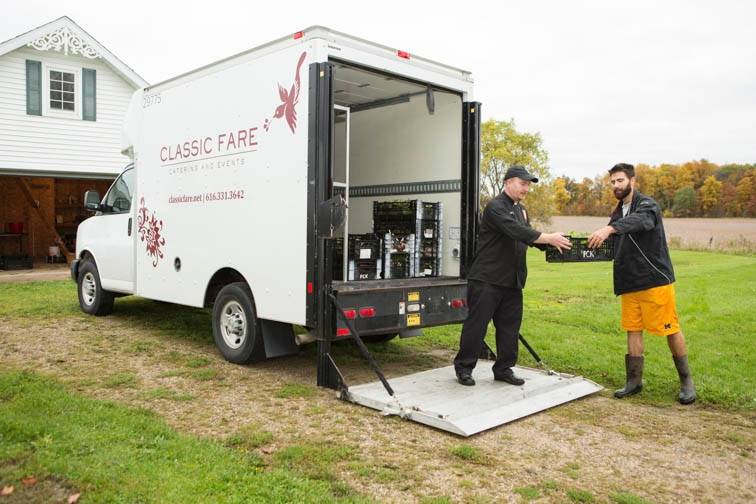
At left, Rick Roberts, from Campus Dining, accepts produce from Youssef Darwich, a student who works at the Sustainable Agriculture Project. The initiative brings fresh herbs and vegetables from SAP to a campus restaurant.
photo by Amanda Pitts
“The produce is grown less than a few miles from the restaurant where it’s being prepared and served,” said Dave Feenstra, project manager for the Sustainable Agriculture Project. “It’s a beneficial collaboration that exposes students to where food comes from.”
Before the produce could be sold and served, a food risk safety assessment through the Michigan Department of Agriculture and Rural Development had to be completed, which included inspections of equipment and procedures at SAP. Feenstra said students and staff members who harvest the produce completed an extensive training program to learn about food safety.
Aaron Johnson, food services director for The Connection and sustainability manager for Campus Dining, said the collaboration began about two years ago. “The partnership aligns with Grand Valley’s commitment to sustainability. It fosters education and community engagement among members of the campus community,” he said.
SAP was established in 2008 and includes two hoophouses used for fall and winter vegetable production and a community supported agriculture program.
Trustees approve property exchange
Grand Valley’s Board of Trustees approved a property exchange and purchase in downtown Grand Rapids to enable the university to expand its growing programs in nursing and health professions.
The approval came at a special board meeting held December 9 to consider the property deal with Spectrum Health. Grand Valley is trading its parking lot on Lafayette Avenue for a Spectrum Health parking lot located next to Grand Valley’s Cook-DeVos Center for Health Sciences on Michigan Street.
Grand Valley’s Lafayette lot is slightly less than an acre (.88 acres) and is located within the Heritage Hill neighborhood. Spectrum Health’s parking lot is 1.4 acres located on Michigan Street, providing more options for Grand Valley for future expansion on the site.
In addition to the swap of land, Grand Valley will pay Spectrum Health $1.85 million in recognition of the differences in size, location and appraised value of each parcel. The university also owns property on the north side of the I-196 expressway, which is planned for additional health campus expansion over the next 25 years.
LGBT Resource Center named for founder
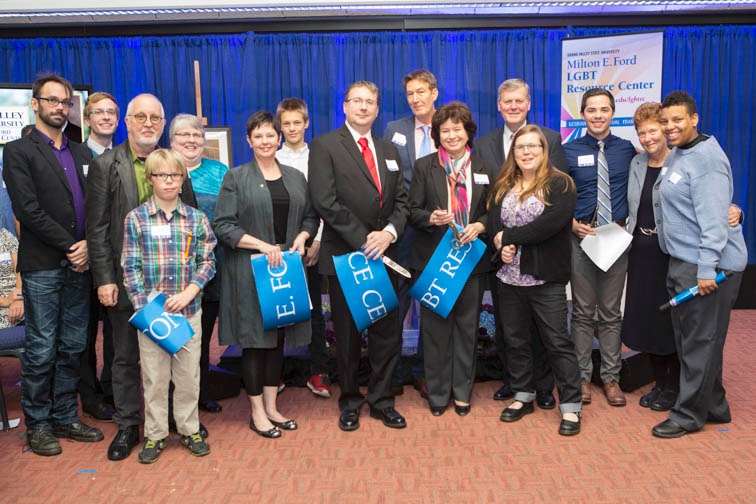
Supporters cut the ribbon November 10 in the Kirkhof Center to celebrate the naming of the Milton E. Ford LGBT Resource Center.
photo by Bernadine Carey-Tucker
Hundreds of supporters packed the Kirkhof Center November 10 to celebrate the naming of the Milton E. Ford LGBT Resource Center.
The center is named for its founding director; Ford died last March following a battle with cancer.
Ford was a professor of English and liberal studies during his 40-plus-year career at Grand Valley but, as speakers said during the ceremony, his other job was to quietly press for creation of a LGBT center on campus.
Wendy Wenner, interim vice president for Inclusion and Equity, said she walked alongside Ford and others who lobbied for a LGBT center. “At one time, his office was the center,” Wenner said. “Under his name on his door in Lake Ontario Hall were the words, ‘LGBT Resources.’”
Wenner said Ford believed that establishing a physical space for a center was important for students.
“The center needed to be a symbol to the LGBT community that they matter,” she said. “It’s not just for the LGBT community, it’s for everyone. It helps us all learn and grow.”
President Thomas J. Haas welcomed the overflow crowd and said the event recognized Ford’s name in connection to the center as well as his legacy.
“We are creating a university that’s making a difference in people’s lives,” Haas said. “We are able to do that because we have had colleagues like Milt Ford, who had a quiet, persistent way to help us all be a family, a community of Lakers.”
Gary Van Harn, Ford’s partner, said Ford started the endowment fund for the center just weeks before he died at age 72. Van Harn, assistant for the Padnos International Center, said it was now his charge to ensure the center remains operational.
Colette Seguin Beighley, director of the center, said the work that goes on inside the center continues Ford’s vision, adding that his vision has expanded beyond the center’s walls to include scholarships, and annual programs like Change U. Seguin Beighley also introduced members of the newly chartered LGBT Alumni Association.
Gayle R. Davis, provost and vice president for Academic and Student Affairs, led the ribbon cutting.
Accountability Report shows strong performance
Grand Valley’s annual Accountability Report shows the university is attracting a record number of students while demonstrating exemplary results in graduation and retention rates. The report also shows the university continues to hold down tuition and administration costs while providing a significant economic impact to the region.
The report tracks more than 40 measures of university performance and student outcomes; it was released at the November 7 Board of Trustees meeting in Allendale.
Highlights from the eighth annual report are below.
• Grand Valley welcomed a record number of first-year students in the fall, bringing the total number of students to 25,094, hitting a major milestone for the university.
• Grand Valley ranks in the top three of all public universities in Michigan for graduation rates, and fourth for retention.
• The university was rewarded by the state Legislature and the governor for a third year in a row with appropriations based on performance.
• Tuition remains in the bottom half of all Michigan public universities, while receiving the lowest state funding per student.
• The economic impact of Grand Valley on Kent, Ottawa and Muskegon counties is $730 million.
The full 2014-15 Accountability Report can be viewed online at www.gvsu.edu/accountability.
Two alumni appointed to Board of Trustees
Gov. Rick Snyder appointed two Grand Valley alumni to the university’s Board of Trustees.
Victor Cardenas, assistant city manager of Novi, and Megan Sall, business development manager for the Right Place Program in Grand Rapids, have been appointed to eight-year terms ending December 31, 2022.
They succeeded trustees Michael Thomas of Freeland and Shelley Padnos of Grand Rapids, whose terms expired at the end of 2014.
Cardenas earned a bachelor’s degree in political science in 2000 and a master’s degree in public affairs from Indiana University. The current assistant city manager of Novi, Cardenas was acting city manager during a vacancy in the top job earlier this year. While at Grand Valley, he was active in student government and was elected president of the Student Senate.
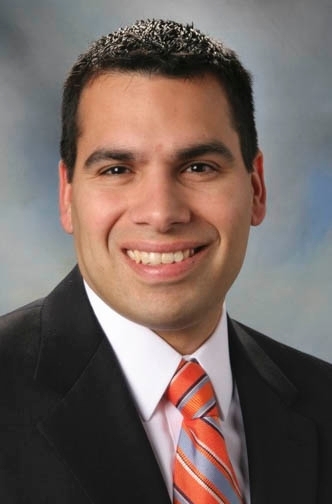
Victor Cardenas
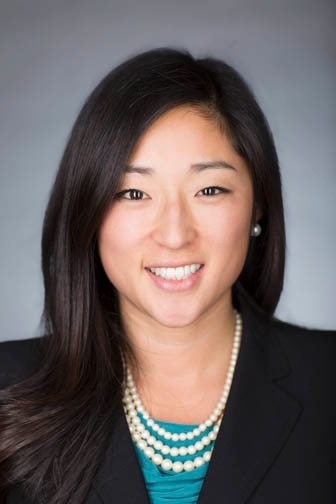
Megan Sall
“I am honored, humbled and excited to serve on my alma mater’s Board of Trustees,” said Cardenas. “I look forward to serving both the student body and alumni base.”
Sall, of Grand Rapids, earned two degrees from Grand Valley: a bachelor’s in international relations in 2007 and a master’s in public administration in 2009. Prior to joining Right Place, Sall was DDA/Community Services director for the City of Wyoming. While at Grand Valley, she was a Cook Leadership Fellow and currently serves as a mentor for the Cook Leadership Academy.
“It’s a privilege and honor to be able to serve the Grand Valley community in this way,” said Sall. “I am excited about all the things Grand Valley is doing and I’m proud of the impact it has on the community.”
Teams win national titles

The Laker soccer team and women’s cross country team celebrate their NCAA Division II championship titles December 6 in Louisville, Kentucky.
photos courtesy of Doug Witte
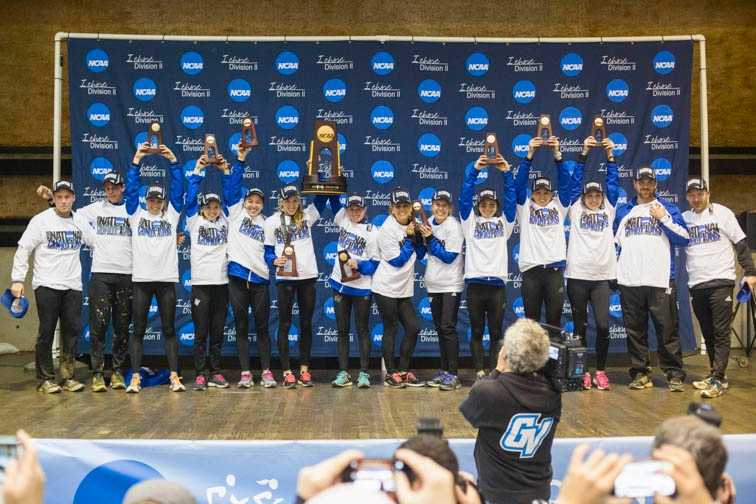
It was a championship December for the Lakers.
Grand Valley’s soccer team and women’s cross country team won national championships December 6 in Louisville, Kentucky, at the NCAA Division II Fall Festival. Soccer captured its second straight national championship with a 3-0 win over Rollins College. Senior Jenny Shaba scored two goals.
Women’s cross country won its third national title and fourth in five years. Sophomore Kendra Foley won the individual title with a time of 21:05.8. The Laker men’s cross country team finished second.
The volleyball team also competed in the NCAA final four and lost to Southwest Missouri State, 3-0, on December 5.
Engineering, computing see record numbers
A record number of students are enrolling in and graduating from engineering and computing programs at Grand Valley.
The Padnos College of Engineering and Computing reported that the number of students majoring in engineering programs has nearly doubled in the last 10 years, and enrollment in computing and informations systems programs has increased by 46 percent since 2006.
Paul Plotkowski, dean of the college, said the growth is attributed to employer demand and student interest, which is a result of more attention being paid to STEM disciplines in K-12 schools.
“The message that these disciplines are making a difference in the world is being heard,” Plotkowski said. “Ten to 15 years ago, you probably never heard of work like biomedical engineering. Today, it’s a very understood thing and a good example of how engineering changes the world.”
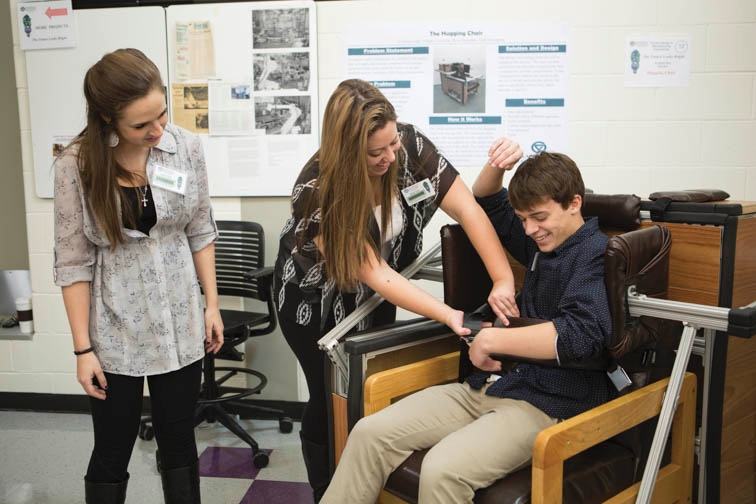
At left, Grand Valley students show the hugging chair, designed to calm children, to a high school during Project Day in December. More than 150 high school students visited campus to learn about computing and engineering careers.
Plotkowski said the No. 1 piece of feedback PCEC receives from students is the benefits of cooperative education, a program that requires students to complete three semesters of paid intern work for an employer that is most often located in West Michigan.
“We’re a very teaching-oriented university, and the internship and co-op program gets our students ready for life and careers, not just theory,” he said. “Most students are offered full-time jobs before they graduate, many times at companies where they completed their co-op experience. The majority of our graduates are working and living in the Grand Rapids area and throughout West Michigan.”
Paul Leidig, director of the School of Computing and Information Systems, said the key strength of the computing programs is offering relevant, industry-based experiences that build students’ technical skills.
Physician Assistant Studies program expands
Administrators and faculty members celebrated the expansion of Grand Valley’s physician assistant program in Traverse City November 11.
The satellite program will open at the Traverse City Regional Center next fall. Andrew Booth, department chair, said students in the master’s level program in Traverse City will interact daily with their counterparts at the Cook-DeVos Center for Health Sciences in Grand Rapids through the use of ITV, a remote site classroom video system.
Booth and Theresa Bacon-Baguley, professor of physician assistant studies, were joined in Traverse City by Jean Nagelkerk, vice provost for Health; Roy Olsson, dean of the College of Health Professions; and Simone Jonaitis, executive director of the Center for Adult and Continuing Studies.
Timothy Nelson, president of Northwestern Michigan College, and Dr. Rob Smith, medical director of Munson Medical Center’s Emergency Department, also made remarks.
Olsson said adding the satellite program allows Grand Valley to enroll more students in the program overall, as students in Traverse City will spend their clinical year in northern Michigan health care facilities.
